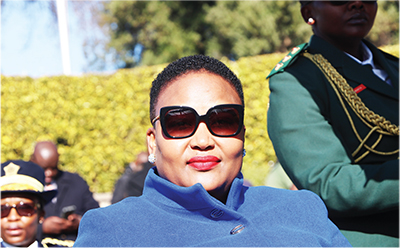By: Thoboloko Ntšonyane
MASERU – Lesotho has been elected for the chairmanship of the African Union’s Bureau of Specialized Technical Committee (STC) on Communication and Information and Communication Technologies (ICT) (STC-CICT).
These developments transpired last week during the biennial meeting of the 5th Ordinary Session of the African Union Specialized Technical Committee on Communication (STC-CICT) that seeks to advance the course for Africa’s digital agenda.
Appointed as the Chairperson in by the African Ministers of Communications, Information and Technology, the Minister of Information, Communications, Science, Technology and Innovation Hon. Nthati Moorosi will be taking charge of the STC-CICT.
She will serve for a two-year tenure.
The session convened under the theme ‘Accelerating digital transformation and advancing communication and advocacy in Africa’ and it was held on November 20-24 at Addis Ababa, Ethiopia.
Taking the baton, the Minister emphasized that the smart strategies, increased domestic investments, and improved collaboration. They can potentially address Africa’s existing challenges that hamper the realization of the promise of a digital economy.
She reassured the Bureau that she will build on the achievements of the outgoing Chairperson.
Moorosi appealed to the members to “continue with their commitment” to serving the Bureau.
“I depend on your support to perfect the work ahead. I have already tasted the support of the commission in this role, which [had just] I assumed… I assure my commitment to moving the work of the Bureau forward from where it is now.
“The dynamic nature of the ICT sector demands continuous dialogue and cooperation. I encourage you all to maintain an open line of communication, share your insights, and collaborate within the confines of this committee,” she said.
Moorosi further commended the AU for making strides towards the acceleration of the digital transformation across critical sectors, and developing digital strategies for education, agriculture, health and inclusive financial sectors.
The Ministerial session was preceded by the experts meeting chaired by the Principal Secretary in the Ministry of Communications, Kanono Ramashamole.
The STCs functions include overseeing development and policy implementation on access to information and freedom of expression; overseeing, promotion of the capacity of the media in the continent, mounting of common Africa e-strategies; discussing resources mobilization and capacity building for the implementation of the African Regional Action Plan on the Knowledge Economy; promoting public investment on Information Communication and Technology (ICT) infrastructure; developing frameworks for ICT policy and regulation harmonization in Africa.
The STC session allows the AU Member States to review policies and strategies aimed at accelerate Africa’s digital transformation in line with Agenda2063; which is about transforming Africa into a global powerhouse of the future through inclusive growth and sustainable development.
The AU’s Digital Transformation Strategy provides a vision and roadmap for harnessing technology and innovation to meet Africa’s development goals.
H.E. Dr Amani Abou-ZEID, AU Commissioner for Infrastructure and Energy reportedly said the Strategy seeks to position Africa at the forefront of harnessing artificial intelligence and to leverage the opportunities that emerging technologies offer while mitigating potential risks and negative impacts.
The Commissioner stressed that the application of the Strategy will require investments in digital infrastructure, skills development, entrepreneurship, research and development.
At this session, concrete recommendations and actions that will fast-track implementation were considered and endorsed by the Ministers. These include; the Institutional Architecture and Implementation Framework for the Digital Transformation Strategy for Africa, a Continental Strategy for creating an enabling environment for a Digital Single Market, an Artificial Intelligence (AI) Strategy Conceptual Framework, a Continental Child Online Safety and Empowerment Policy, the Malabo Review Report, and a study on digitalizing postal services were considered by the Ministers.
The meeting also studied the progress registered in executing core communication initiatives that are also aimed at promoting the Agenda2063 and building the corporate brand identity to raise visibility and increase outreach.


